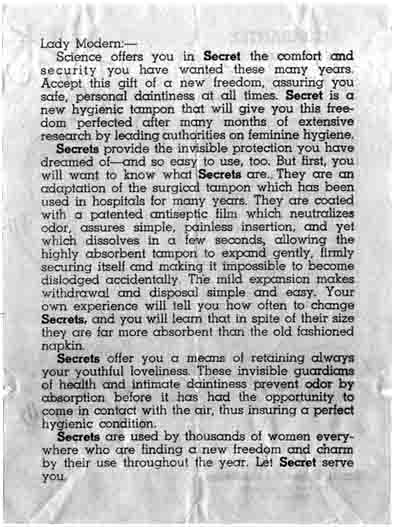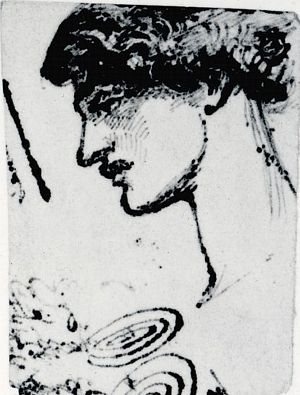I enjoy being a girl.
This evening, I followed up on this brand's tagline, figuring that I'd discover a full-fledged marketing campaign associated with it. And I was correct: there's a whole website called BeingGirl (not Being A Girl, just BeingGirl) (which is "by girls, for girls") designed to provoke positive feelings in girls, in particular, toward a pair of sister brands. "This is the time of the month that is all about you," one main page in this website proclaims. "You have the right to make it the best it can possibly be, and we're here to help." (Of course, another message in the three-part sequence of images in which we find that mantra is "No roaming charges," whose meaning in this context I can barely fathom.)
Intellectually, I grasp the reasons for this advertising campaign: the desire to make this brand seem hip and happy, in order to capture and keep the ever-renewing population of menstruating women as purchasers and users. And it's not as though this kind of ideologically charged campaign is anything new. Witness, courtesy of (who knew?!) the Museum of Menstruation, one side of the package insert for "Secret" brand tampons, ca. 1930s:

How different is it, really, to insist upon the happiness of a period, on one hand, or to declare a tampon "a means of retaining always your youthful loveliness," on the other? Did anyone fall for the line about "safe, personal daintiness" when this product first appeared? I'd guess that, just as now, women in the 1930s sought the product that did the most both to minimize nuisance and to boost comfort. I'd guess that sometime when "Secrets" (and all the other tampons that came on the market in the 1930s) appeared, some woman rolled her eyes at the very idea of this product as an "invisible guardian of health and intimate daintiness"--because either it worked for her, or it didn't.
I once knew a guy who, during his chemical engineering studies, interned at Kotex. "Why do you guys have to make the packaging on pads and tampons so glaringly bright?" I asked him one time. "Can't you just put these things in relatively low-key bags and boxes? It's not as though we're likely to stop buying them." Within a couple of years, they'd gone over to their white boxes decorated with single red flowers--a classier touch than wacky bright pastels, but still a bit more heavy-handed than is really necessary.
It's all just so silly, really, which brings me back to my ironically put title. Back in 2002, the partner of one of my soon-to-be Chicagoan friends introduced me to Flower Drum Song, the Rodgers and Hammerstein musical that ran on Broadway and the West End from 1958-60 and then became a motion picture in 1961. His rendition of "I Enjoy Being a Girl" was my introduction to the show. "I'm strictly a female female," exults Linda Low, the musical's protagonist. I can't help but wonder whether the advertising people working for Procter and Gamble had Linda's lyrics in mind while they worked up the BeingGirl website's concept. But doesn't it seem particularly invidious to try and define one's period as the time of the month that's all about her? If anything, doesn't menstruation represent one time of the month that simply can't just be about an individual girl or woman and her individual desires, given that it's a forceful reminder of an other-generating biological process? On the other hand--and somehow I suspect that this idea was furthest from the advertising execs' minds when they crafted the "Have a happy period" campaign--it is indeed the case that the onset of a period is also a forceful reminder (for good or ill) that one is still simply oneself, not oneself and the beginnings of another.
None of these musings or reflections finds anything like thoughtful recognition and engagement in advertising that focuses on eating chocolate wantonly or crying uncontrollably or painting one's toenails, or in promotional literature that stresses "intimate daintiness" and "youthful loveliness." And so it is that I've sent offending wrapper after offending wrapper off to the trash today, refusing to comply with their demands that I have a happy period. I will not be interpellated by my feminine hygiene products and their makers. I refuse this hail, cheery though it may seem.
source for tonight's image: the Museum of Menstruation.


6 Comments:
Oh. My.
doesn't menstruation represent one time of the month that simply can't just be about an individual girl or woman and her individual desires, given that it's a forceful reminder of an other-generating biological process?
Less and less, as more women take birth control pills to decide the timing of their periods. Some women only have one or two periods a year.
Well, I did think of that last night, while I was writing. However, it's still one of those technologies that works for some but not for others; some of us can't take the pill because of its side effects.
I do think, though, that your comment helps me bring into focus one of the motivations behind the "have a happy period" campaign, which is to keep girls thinking that they *should* be having (happy!) periods every month, when some doctors are suggesting precisely the opposite. There was a terrific article in The New Yorker several years ago suggesting that one of the reasons for the higher incidence of ovarian and uterine cancers in some parts of the world may simply be that women are menstruating more than ever before in history, simply because they're delaying first pregnancy or choosing not to have children.
Is it possible that the whole "Have a happy period" campaign is geared, in part, toward getting girls to think of "enjoying" their periods as the utmost in self-empowerment, so that they might not even consider those possibilities that would keep them from becoming Procter & Gamble consumers? Is this actually all about P&G going head to head with Barr Pharmaceuticals?
the whole concept of daintiness has been stuck in my head for the past couple of days. (thanks a lot) and chagrin and a keen sense of the ludicrous as this morning, in my silk summer dress and large hat--to protect my daintiness--I am jump-starting my raggedy car, trunk collapsing onto my shoulders, the swamp smell of rotting upholstery, a dead click, a spark, now ignition.
Lady Modern, forget about daintiness! (Can we all call each other Lady Modern now?)
hah, I have already had the hell gigged out of me--and rightfully so--by being called Jolly Lady, how mortifying is that? give me modern any day.
Post a Comment
<< Home